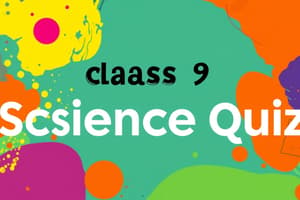Podcast
Questions and Answers
What effect does the introduction of a new variable have on the results of an experiment?
What effect does the introduction of a new variable have on the results of an experiment?
- It has no impact on the experimental outcome.
- It can create new results that need to be analyzed. (correct)
- It always confirms the hypothesis.
- It simplifies the conclusions drawn from the data.
Which best describes the outcome when multiple trials of an experiment yield inconsistent results?
Which best describes the outcome when multiple trials of an experiment yield inconsistent results?
- The variables involved are easily controlled.
- The initial hypothesis is proven correct.
- The experiment may require reevaluation. (correct)
- The experiment is successful.
What is the primary purpose of a control group in an experiment?
What is the primary purpose of a control group in an experiment?
- To validate the independent variable's effects.
- To ensure results are unpredictable.
- To change the variables frequently.
- To provide a baseline for comparison. (correct)
Why is repeatability important in scientific experiments?
Why is repeatability important in scientific experiments?
Which action should a researcher take if their findings consistently contradict an established theory?
Which action should a researcher take if their findings consistently contradict an established theory?
How can external factors influence scientific experiments?
How can external factors influence scientific experiments?
What role does a hypothesis play in an experiment?
What role does a hypothesis play in an experiment?
What should researchers do after analyzing their data?
What should researchers do after analyzing their data?
What is a common misconception about scientific experiments?
What is a common misconception about scientific experiments?
Which aspect of scientific methodology is often misunderstood?
Which aspect of scientific methodology is often misunderstood?
What is an incorrect view about the scientific process?
What is an incorrect view about the scientific process?
Which statement about data interpretation is often misinterpreted?
Which statement about data interpretation is often misinterpreted?
What is a prevalent misunderstanding about scientific theory?
What is a prevalent misunderstanding about scientific theory?
In what way do students commonly confuse scientific laws and theories?
In what way do students commonly confuse scientific laws and theories?
What incorrect assumption do students make about scientific research?
What incorrect assumption do students make about scientific research?
What is a common flaw in students' understanding of peer review?
What is a common flaw in students' understanding of peer review?
Flashcards are hidden until you start studying
Study Notes
- No specific content available from the links provided; focus on key concepts in a typical Science Form 2 curriculum.
Common Topics in Form 2 Science
- Scientific Method: Steps include observation, hypothesis formation, experimentation, and conclusion.
- Matter: Defined as anything that has mass and occupies space. Consists of atoms and molecules.
Properties of Matter
- Physical Properties: Characteristics observable without changing substance (e.g., color, density, melting point).
- Chemical Properties: Describe how a substance reacts with other materials (e.g., flammability, reactivity).
States of Matter
- Solid: Definite shape and volume; particles closely packed and vibrate in place.
- Liquid: Definite volume but no definite shape; particles are close but can move past one another.
- Gas: No definite shape or volume; particles are far apart and move freely.
Changes in States of Matter
- Melting: Solid to liquid; occurs at the melting point.
- Freezing: Liquid to solid; occurs at the freezing point.
- Evaporation: Liquid to gas; takes place at any temperature below boiling point.
- Condensation: Gas to liquid; occurs when gas cools and particles slow down.
Elements and Compounds
- Elements: Pure substances that cannot be broken down; made of only one type of atom (e.g., oxygen, hydrogen).
- Compounds: Substances formed by chemically combining two or more elements (e.g., water = H2O).
Classification of Living Organisms
- Five Kingdoms: Monera, Protista, Fungi, Plantae, Animalia; categorized based on characteristics like cellular structure and nutrition.
Ecosystems and Environment
- Ecosystem: Community of living organisms interacting with their environment.
- Food Chains: Show how energy is transferred through different organisms; starts from producers (plants) to various consumers (herbivores, carnivores).
Human Body Systems
- Circulatory System: Composed of the heart, blood, and blood vessels; responsible for transporting nutrients and oxygen.
- Respiratory System: Involves lungs and airways; enables gas exchange (oxygen inhalation and carbon dioxide exhalation).
Basic Principles of Physics
- Forces: Any interaction that changes the motion of an object; includes friction, gravity, and tension.
- Energy: The capacity to do work; exists in various forms such as kinetic, potential, thermal, and chemical.
Importance of Science Education
- Encourages critical thinking and problem-solving skills.
- Enhances understanding of the natural world and technological advances.
These topics provide foundational knowledge crucial for Form 2 Science studies.
Studying That Suits You
Use AI to generate personalized quizzes and flashcards to suit your learning preferences.




